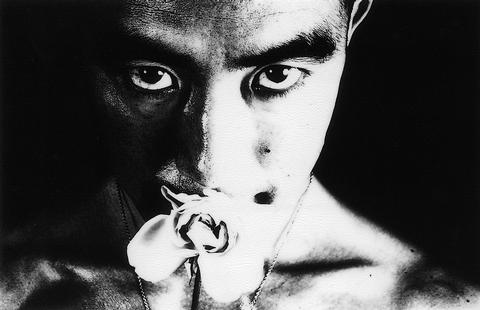Within 24 hours of completing his final novel, Yukio Mishima roused his own personal paramilitary force to storm a Japanese government compound. There, after delivering a fervent address in support of radical Japanese nationalism, he retired to a private chamber to commit ritual suicide. The year was 1970.
Almost a decade earlier, Mishima had been immortalized in photographs by one of Japan's greatest photographers of the post-war era, Eikoh Hosoe. Hosoe will come to Taipei this weekend for the commencement of a series of events at an Eslite Bookstore that are grouped under the heading, "Eikoh Hosoe photographs: `Ordeal by Roses' -- the shadow of Yukio Mishima."
Born in 1933, Hosoe was recognized in his youth as a photographer prodigy. Though his early work was influenced by the photo-journalistic vogue in Japan following World War II, he quickly moved into styles of grainy, high contrast and solarized surrealism and later into a purer and formalist vein of 1970s minimalism.

Hosoe also drew from parallel influences in dance, literature and other Japanese arts to which it was contemporary, and his photographs often included famous figures from the arts, like Mishima.
Hosoe's photographic series on display for the next three weeks at the Eslite Gallery will include "Ordeal by Roses," featuring Mishima, and "Embrace" of 1970.
Hosoe, who is proficient in English and has been serving as a professor of photography at the Tokyo Institute of Polytechnics since 1975, will visit Taipei for three days to kick off the event, taking part in a public discussion of his works and his life on Sunday afternoon. For three Sundays afterwards, Eslite will show one film relating to the biography and literature of Mishima.

Hosoe is still best known for "Ordeal by Roses," a photographic project that began as a publicity vehicle for Mishima and survives as a representation of the great contrasts inherent in the writer's repressively stratified life.
Most of the pictures show Mishima wearing only a traditional loin cloth, framed bizarrely as a modern Japanese Adonis and posing against the classical western statuary and painting the radical Japanese nationalist kept in his home. For many of the pictures, Mishima is also bound with a garden hose.
Taken as a whole, Hosoe's series serves as an eroticized Alice in Wonderland exploration into Mishima's psyche, providing a glimpse at Mishima's unacknowledged homosexuality (which, now well documented, is still denied by his widow), his obsession with physical beauty, and the other strange workings that have made Mishima into a legend.
Films: All films will be shown for free at the Eslite Bookstore.
Sunday, Oct. 22, 2:30pm.
"Mishima -- A life in four chapters," directed by Paul Schrader (USA) 1985. A mixture of Japanese and English, with Chinese subtitles. Starring Ken Ogata.
Regarded as Mishima's definitive film biography, the film looks at one of Japan's most enigmatic figures from the many facets that formed his puzzling whole: the brilliant and prosaic novelist, bodybuilder, disillusioned nationalist radical, misfit homosexual and founder of a private army. The story is told in a collage of black-and-white and color sequences from his novels and plays, history and biography, playing out Mishima's life as the fantastical tale that has fascinated Japan and the world.
Sunday, October 29, 2:30pm.
"The sailor who fell from grace with the sea," directed by Lewis John Carlino (UK), 1976. English with Chinese subtitles. Starring Sarah Miles and Kris Kristofferson.
Reset in England, this adaptation of one of Mishima's best-known novels tells the story of a sea captain, who is initially portrayed as a paradigm of masculinity and freedom, but later departs from that image to fall in love with a widow in a lonely harbor town. Impelled by an odd philosophical mix of nihilism and idealism, a group of boys, who once idolized the captain, cannot bear to see his spirit defiled, so they act.
Followed by:
"Yenjo" (炎上), directed by Kon Ishikawa (Japan), 1958. Japanese with Chinese subtitles.
A Japanese classic in its own right, this film is based on "The Temple of the Golden Pavilion," a novel Mishima wrote in 1956 and is generally regarded as one of his masterpieces. It fictionalizes the burning of a famous Kyoto temple in 1950, telling the story of a young boy who, plagued with poverty and physical disabilities, becomes a Zen Buddhist acolyte. Out of weakness, the boy develops an obsessive love for the Golden Pavilion. As an object, the pavilion is so beautiful, the boy's only means of overcoming it is to destroy it, and thus set himself free.

One of the most important gripes that Taiwanese have about the Democratic Progressive Party (DPP) is that it has failed to deliver concretely on higher wages, housing prices and other bread-and-butter issues. The parallel complaint is that the DPP cares only about glamor issues, such as removing markers of Chinese Nationalist Party (KMT) colonialism by renaming them, or what the KMT codes as “de-Sinification.” Once again, as a critical election looms, the DPP is presenting evidence for that charge. The KMT was quick to jump on the recent proposal of the Ministry of the Interior (MOI) to rename roads that symbolize

On the evening of June 1, Control Yuan Secretary-General Lee Chun-yi (李俊俋) apologized and resigned in disgrace. His crime was instructing his driver to use a Control Yuan vehicle to transport his dog to a pet grooming salon. The Control Yuan is the government branch that investigates, audits and impeaches government officials for, among other things, misuse of government funds, so his misuse of a government vehicle was highly inappropriate. If this story were told to anyone living in the golden era of swaggering gangsters, flashy nouveau riche businessmen, and corrupt “black gold” politics of the 1980s and 1990s, they would have laughed.

It was just before 6am on a sunny November morning and I could hardly contain my excitement as I arrived at the wharf where I would catch the boat to one of Penghu’s most difficult-to-access islands, a trip that had been on my list for nearly a decade. Little did I know, my dream would soon be crushed. Unsure about which boat was heading to Huayu (花嶼), I found someone who appeared to be a local and asked if this was the right place to wait. “Oh, the boat to Huayu’s been canceled today,” she told me. I couldn’t believe my ears. Surely,

When Lisa, 20, laces into her ultra-high heels for her shift at a strip club in Ukraine’s Kharkiv, she knows that aside from dancing, she will have to comfort traumatized soldiers. Since Russia’s 2022 invasion, exhausted troops are the main clientele of the Flash Dancers club in the center of the northeastern city, just 20 kilometers from Russian forces. For some customers, it provides an “escape” from the war, said Valerya Zavatska — a 25-year-old law graduate who runs the club with her mother, an ex-dancer. But many are not there just for the show. They “want to talk about what hurts,” she